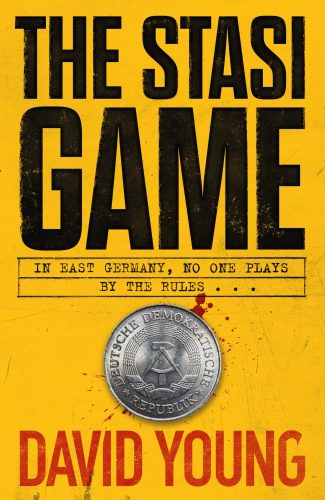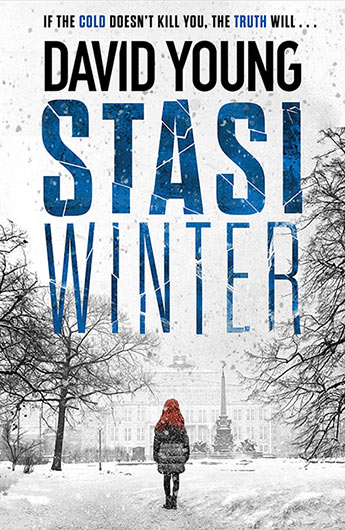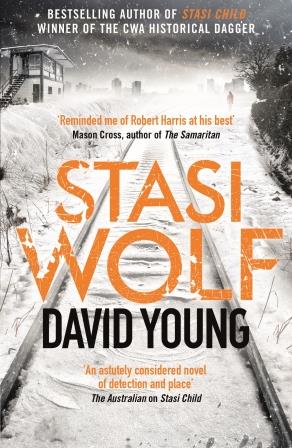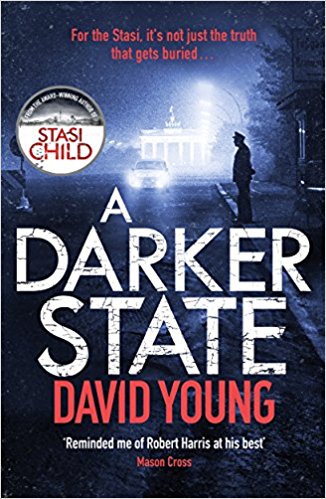
People’s Police murder squad leader Karin Muller has been through a lot.
When I read Young’s stunning debut novel, ‘Stasi Child’, I delighted in the clever and absorbing story, but wondered what else Young could throw at his rather naïve, highly principled and dedicated detective. The answer has turned out to be, a heck of a lot, but in ‘Stasi Game’ we may have reached the end of our time with Hauptmann Muller and sidekicks Oberleutnant Tilsner and Kriminaltechniker Schmidt, who specialised in investigating crimes that the Stasi didn’t want them to solve.
I am now equally delighted to find that Young’s latest excursion to Communist East Germany is another genuinely thrilling tale of espionage, in which readers are treated to an intriguing story that gradually winds you in so tightly you almost forget to breathe at the very height of the suspense. (Can they? Will they? Did they?)
What’s it about?
East Germany, 1982. A man’s body is found encased in concrete on a building site near Dresden. When Muller arrives to investigate she is disturbed to note his arm is reaching out of the concrete; how is it possible that this wasn’t reported sooner? Or perhaps it was reported, but not to the Volkspolizei…
As a People’s Police officer, Muller is used to having her investigations compromised, limited and commandeered by the Stasi, East Germany’s Secret Police, so when a local Stasi officer informs her that his officers will maintain a ‘watching brief’, she is frustrated but resigned to being tailed, getting told off and having her investigation tampered with.
What does surprise her is becoming a pawn between two secret services – the East German Stasi and Britain’s M16 – both organisations who are ready to kill to ensure their version of truth is the only version people hear…
What’s it like?
Deeply absorbing. Genuinely thrilling. This may be Young’s best novel to date. I loved the storyline, which was slightly unusual for this series in that it involved actual espionage of a sort, rather than more typical Stasi repression and secret keeping, though there’s plenty of that too.
As always, Muller finds herself in increasingly hot water as the story develops, though I suppose I should say icy water, as this is a series and a book set in a relentlessly chilly – as well as chilling – atmosphere. Indeed, this seems to be the main purpose behind Muller’s appointment, not to solve the case she is given, but to place her in danger. After all, this is a detective in disgrace, an investigator who was originally promoted to be clueless but who persists in seeking to unearth the truth.
The characterisation here is superb, from Young’s creation of the Hitler-loving, manipulative Lotti, to the increasingly side-lined Stasi agent, Jager, who is horrified to see his power slipping away from him, to the inherently honest detective Muller, who truly believes in the Communist ideal and, brilliantly, ascribes touchingly unwarranted attributes to several other characters as she bravely thrusts herself into danger once again.
Writing historical fiction
I’ve always felt that the best historical fiction does two things really well: integrates fascinating historical detail within a genuinely interesting story, and leaves you with a strong desire to learn more about some of the featured events or characters. Young achieves the first seamlessly and I have spent much of today reading up on the Dresden fire-bombing.
As is the case with all Young’s Stasi novels, he has selected a few particularly significant elements from the history of East German Communist state and the Second World War to explore, and has achieved this in a nuanced way, filtering the past through various perspectives, forcing us to wonder what it might have been like to live and work in the DDR, avoiding simplistic moral judgements. In a word: fabulous. (The book, not living in the DDR!)
Final thoughts
Although I’ve considered this novel very much in the context of the Stasi series narrative arc, this works very well as a standalone. Unlike Young’s previous novel, ‘Stasi Winter’, which referred strongly to preceding novels, ‘The Stasi Game’ stands by itself as an interesting case, with a challenging investigation (how can you be sure any evidence you possess is accurate when it’s all been filtered through the Stasi?) and an incredibly gripping denouement. If this does turn out to be the final novel in the series, it’s a superb finale, with a perfect epilogue.
As for me, I’ve moved from thinking I’m not really a fan of spy thrillers or war stories to realising I am a big fan of David Young and I look forward to exploring whatever world he tackles next.
‘The Stasi Game’
David Young,
2020, Zaffre, paperback
Thanks to Bonnier Books for providing me with a copy of this book in exchange for an honest review.
My reviews of previous Stasi books can be found here: ‘Stasi Child‘, ‘Stasi Wolf‘, ‘A Darker State‘ (subsequently renamed ‘Stasi State’), ‘Stasi 77‘ and ‘Stasi Winter‘.


